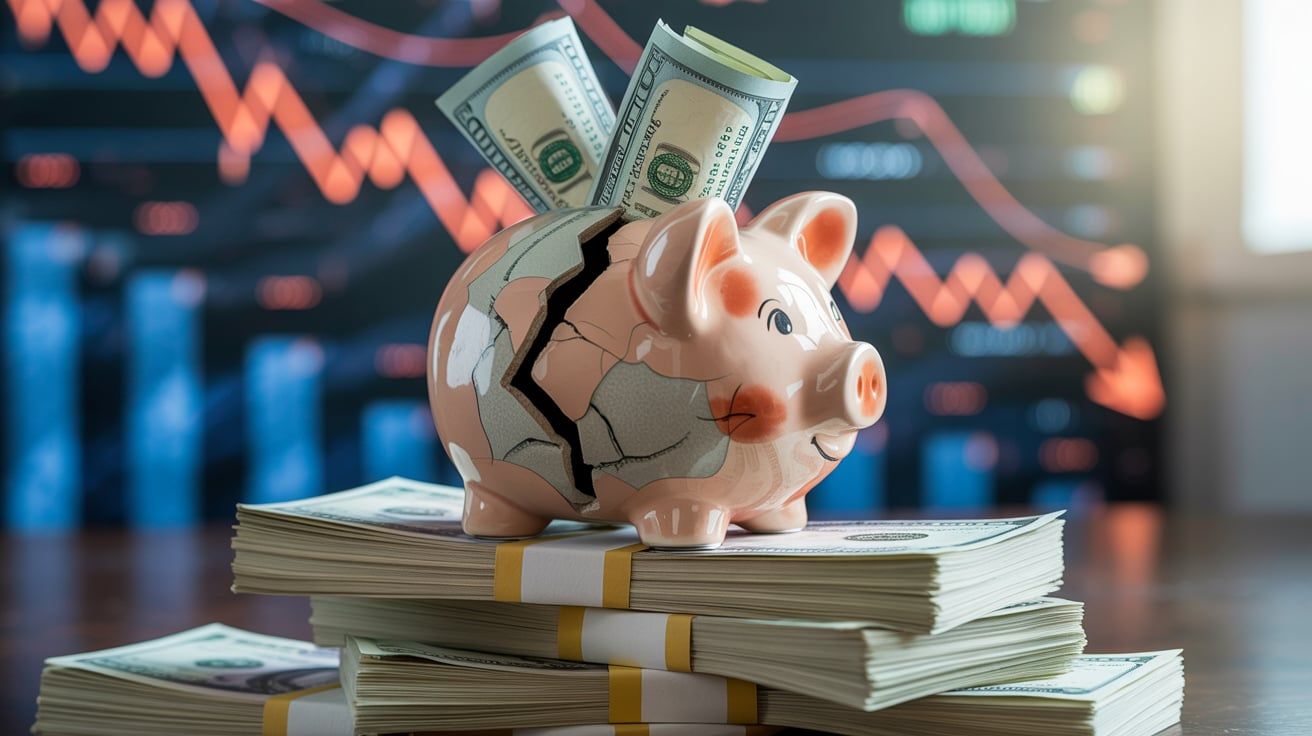
Introduction: The Latte Lie
Imagine this: you’re standing in line at your favorite coffee shop, latte in hand, swiping your credit card without a second thought. It’s just a few dollars, right? What harm could it possibly do? This seemingly insignificant daily habit, multiplied by countless other small purchases, is often the very thing that’s silently sabotaging your financial future. It’s not the latte itself, but the mindset it represents – a casual acceptance of debt that can snowball into a mountain of financial stress, impacting everything from your ability to secure loans to your long-term retirement savings.
We’re not here to demonize credit cards. Used responsibly, they can be powerful tools for building credit and earning rewards. However, the ease and convenience they offer often mask a dangerous trap: the accumulation of high-interest debt that slowly erodes your financial well-being. Let’s delve into the specific ways this seemingly harmless habit can derail your future and, more importantly, how to break free from its grip.
The High Cost of Minimum Payments
The minimum payment – that deceptively small number on your credit card statement – is designed to keep you in debt, not get you out of it. While it might seem manageable in the short term, consistently paying only the minimum means you’re primarily covering interest charges, with only a tiny fraction going towards the principal balance. This prolongs the repayment period, significantly increasing the total amount you’ll ultimately pay. Think of it as renting money indefinitely, constantly enriching the credit card company while your own financial goals remain out of reach.
For example, let’s say you have a $5,000 balance on a credit card with an 18% interest rate. If you only make the minimum payment (typically around 2-3% of the balance), it could take you decades to pay it off, and you’ll end up paying thousands of dollars in interest. That’s money that could be used for a down payment on a house, funding your children’s education, or boosting your retirement savings. The minimum payment is a financial quicksand, slowly but surely sucking you under.
The Impact on Your Credit Score and Loan Eligibility
Your credit score is a crucial indicator of your financial health, influencing everything from your ability to get approved for loans to the interest rates you’ll receive. High credit card balances, especially when approaching your credit limit, negatively impact your credit utilization ratio, a significant factor in determining your score. A lower credit score translates to higher interest rates on mortgages, auto loans, and even personal loans, costing you thousands of dollars over the life of these loans.
Imagine you’re trying to buy your first home. A poor credit score, stemming from years of credit card debt, could mean the difference between qualifying for a low-interest mortgage and being denied altogether, or being stuck with a high-interest rate that makes homeownership unaffordable. Similarly, if you need a loan to start a business, a damaged credit score can hinder your ability to secure funding, stifling your entrepreneurial dreams. Your credit card habits today directly impact your access to credit and the terms you receive in the future.
The Opportunity Cost: Lost Investment Potential
Every dollar spent on credit card interest is a dollar that could be invested and growing over time. Consider the power of compound interest – the ability of your investments to generate earnings, which then generate their own earnings. By consistently paying down your credit card debt, you free up cash flow that can be channeled into investment opportunities, such as stocks, bonds, or real estate. Over the long term, these investments can generate significant returns, building wealth and securing your financial future.
Let’s say you’re paying $200 per month in credit card interest. If you instead invested that $200 each month in a diversified portfolio with an average annual return of 7%, you could accumulate a substantial nest egg over several decades. This highlights the opportunity cost of carrying credit card debt – the potential for wealth creation that’s being sacrificed to pay off high-interest charges. Prioritizing debt repayment allows you to unlock your investment potential and accelerate your journey towards financial freedom.
The Psychological Toll of Debt
The burden of credit card debt extends beyond the financial realm, taking a significant toll on your mental and emotional well-being. Constant worry about bills, fear of missed payments, and the feeling of being trapped in a cycle of debt can lead to stress, anxiety, and even depression. This psychological burden can impact your relationships, your work performance, and your overall quality of life. It’s a silent killer, eroding your happiness and preventing you from fully enjoying the present moment.
Many people find themselves avoiding opening their credit card statements or constantly checking their bank accounts, fearing the reality of their debt situation. This avoidance only exacerbates the problem, as it prevents them from taking proactive steps to address it. Recognizing the psychological impact of debt is the first step towards breaking free from its grip and reclaiming your peace of mind. Financial freedom is not just about numbers; it’s about emotional well-being and a sense of control over your life.
The Impact on Your Retirement Savings
Credit card debt can severely hinder your ability to save for retirement. Every dollar spent on interest is a dollar that’s not going into your 401(k), IRA, or other retirement accounts. This can significantly impact your ability to accumulate sufficient savings to maintain your desired lifestyle in retirement. The longer you delay saving for retirement, the more you’ll need to save each month to catch up, making it even more challenging to achieve your financial goals.
Imagine reaching retirement age and realizing that you haven’t saved enough to cover your expenses. This can lead to a stressful and uncertain future, forcing you to rely on social security or work part-time to make ends meet. By prioritizing credit card debt repayment and starting to save for retirement early, you can avoid this scenario and ensure a comfortable and secure retirement. Remember, retirement savings is a marathon, not a sprint, and every dollar counts.
Breaking the Cycle: Practical Strategies for Debt Repayment
Breaking free from the cycle of credit card debt requires a strategic and disciplined approach. Start by creating a budget to track your income and expenses, identifying areas where you can cut back on spending. Next, explore different debt repayment strategies, such as the debt snowball method (paying off the smallest balance first for quick wins) or the debt avalanche method (paying off the highest interest rate first to save money in the long run). Consider consolidating your debt with a balance transfer credit card or a personal loan to lower your interest rate.
Negotiate with your credit card company to lower your interest rate or waive late fees. Automate your debt payments to avoid missed payments and late fees. Seek professional help from a financial advisor or credit counselor if you’re struggling to manage your debt on your own. Remember, you’re not alone, and there are resources available to help you get back on track. The key is to take action and commit to a plan that works for you.
Building a Debt-Free Future: A Mindset Shift
Ultimately, breaking free from the credit card trap requires a fundamental shift in mindset. It’s about prioritizing financial responsibility, making conscious spending decisions, and viewing credit cards as tools to be used wisely, not as a source of endless funds. Cultivate a habit of saving and investing, even small amounts, to build a solid financial foundation. Focus on building wealth and achieving your long-term financial goals, rather than getting caught up in the instant gratification of credit card spending.
Embrace a minimalist lifestyle, focusing on experiences and relationships rather than material possessions. Practice gratitude for what you have and avoid comparing yourself to others. By adopting a debt-free mindset, you can create a more secure and fulfilling financial future, free from the stress and anxiety of credit card debt. It’s a journey, not a destination, and every step you take towards financial freedom is a step in the right direction.
Conclusion: Take Control of Your Financial Destiny
The credit card mistake that’s quietly destroying your future isn’t about a single purchase; it’s about a pattern of behavior that leads to high-interest debt and missed opportunities. By understanding the true cost of credit card debt and implementing practical strategies for repayment, you can break free from this cycle and take control of your financial destiny. It’s time to prioritize your financial well-being, invest in your future, and build a life of financial freedom and security. Don’t let credit card debt hold you back from achieving your dreams. Start today, even with small steps, and watch your financial future transform.
What’s one small change you can make today to start paying down your credit card debt? Maybe it’s skipping that daily latte, packing your lunch instead of eating out, or setting up automatic payments. Whatever it is, take that first step now. Your future self will thank you. Consider speaking with a financial advisor to create a personalized plan for debt repayment and investment. The time to act is now. Don’t let another day go by with your financial future at risk.



